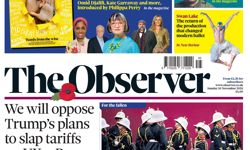
Something odd happened at a gastropub in London’s Muswell Hill two years ago. The Victoria Stakes could not operate as a business because of Covid but a few people started meeting there regularly with the windows wide open.
They were journalists on a mission and the challenge was something that has become something of a Holy Grail – how do you devise from scratch a news business that reaches out to young adults with accurate, reliable information. The sort of young adults long since lost to the internet with its uneven mixture of facts, conspiracy theories and downright falsehoods.
“I have been obsessing for some time about the paucity of news available for young adults, tracking my own grown up children,” says Sir William – Will – Lewis.
“They are very curious about the world but were never going to take out a subscription to The Guardian or secretly listen to the Today programme. They were getting their news from TikTok, YouTube Shorts and SnapChat,” Lewis adds.
He already knew how difficult it was to get it right. While chief executive of Dow Jones, and publisher of The Wall Street Journal, the company had launched Young Journal, an attempt to provide Journal journalism for young adults.
The experience convinced him such news could only be really authentic if young adults were telling the news to young adults and providing it where they were.
“You can only achieve that authenticity, that passion, that energy if you do it as a stand-alone business,” says Sir William.
Back in the Victoria Stakes, “something magical happened” as the word spread and similarly motivated people turned up in the otherwise empty pub and an idea was shaped into reality.
Launch of The News Movement
Around $15 million was raised mainly from high net worth individuals and a year ago, The News Movement was launched with Lewis as chief executive and co-founder Kamal Ahmed, former editorial director of BBC News, as editor-in-chief.
There are now 60 staff based not in a pub but AP’s headquarters in London and New York.
Lewis has reached this point after 33 years in journalism, a career that apart from Dow Jones, has included stints as an investigative reporter for the Financial Times and editor and editor-in-chief of the Daily Telegraph.
There was controversy over leaks apparently from the Telegraph stable of remarks by then Business Secretary Vince Cable about Rupert Murdoch that resulted in Cable standing aside from adjudicating on a Murdoch bid for control of satellite broadcaster BSkyB.
There was also controversy over Lewis’s role in the committee set up by News International to investigate phone hacking and payments to police at the News of the World.
Such controversies however are far overshadowed by two remarkable pieces of journalistic investigations ultimately overseen by Lewis – the Daily Telegraph’s exposure of the MPs’ expenses scandal, and in the US, the Theranos fake blood testing business whose founder is now in jail.
Yet after what he describes as “six magical years,” in 2020 Lewis left Dow Jones in what he insists was a completely amicable parting.
He had been “on the road” at that point for eight years and was afraid the pressure was going to catch up with him.
Perhaps more importantly, he believes his career has been defined by punctuation marks where at intervals he has deliberately taken himself off and significantly out of his comfort zone.
“It was time to go and do something completely different, still in news, but really quite scary,” explains Lewis who was already thinking about that possible gap in the market – tracking down the missing young adults of Gen Z.
And that road led to the pub in Muswell Hill. One of those who attended the early meetings was Lucy Marley who was working for Sky at the time. She had just been nominated for an award for an interview with Hada Muthana, an American who joined ISIS now in a Syrian refugee camp.
Before raising the $15 million, the group self-funded “the Beta phase” where they tried to find the right formula on how to produce “non-partisan high quality news, but by young people for young people”.
The official launch last October of The News Movement was followed this year by a knighthood for Lewis in Boris Johnson’s resignation honours list – he had been an advisor to the disgraced former prime minister.
By any standards, it has been a remarkable year for The News Movement, which aims its video content at TikTok, YouTube Shorts and Snap where Gen Z hangs out.
The organisation produces backgrounders on everything from the latest position in Ukraine to analysis on whether Prime Minister Rishi Sunak is really backtracking on the green agenda.
Recently, a report sparked interest in Wales with revelations about the extent to which an evangelical church is infiltrating Welsh society.
This October, The News Movement added audio content as it launched, in collaboration with audio specialists Persephonica, a 12-part series of podcasts called Noted, tackling subjects such as drug testing at music festivals to increased travel to Turkey for plastic surgery.
The organisation is also working with “creators” – people who have large online followings on specialist subjects such as, for example, make-up, and training them to add news to their output.
“We do social media for other media companies – such as David Montgomery’s National World – traditional media companies know they have to do social to reach the under 30s but you have to have a young newsroom and you have to have filming expertise,” Lewis explains.
Next year should be a big year for The News Movement with elections in both the US and UK and revenues on track to break even.
On the acquisitions trail
Remarkably, The News Movement has already completed a small acquisition, the purchase of Recount, an American video service devoted to reliable politics.
“If you are an American 23-year-old, that is where you get your political news,” says Lewis who adds that there is another $10 million available for potential acquisitions.
The group tried, unsuccessfully, to buy The Athletic, the sports publisher owned by the New York Times and was outbid by Future for Dennis Publishing, owners of The Week.
“Acquisitions have always been intended as part of our development,” explains Lewis who now remarkably is looking at a potential bid for the Telegraph Media Group.
A crowded auction will begin this October and is expected to involve the usual players – Daily Mail and General Trust, Murdoch’s News Corp, David Montgomery’s National World, and associated billionaire trophy hunters.
Former owner Sir Frederick Barclay is even trying to rebuy the Daily Telegraph group from current owners Lloyds Bank with the help of Middle East funds.
Lewis, former editor-in-chief of the Daily Telegraph appreciates the value of what he believes is one of the “top ten mastheads” in the English speaking world.
“The brand is fantastic. It is trusted, built up over years and years. We love what the Telegraph stands for and we love the journalism. We think the journalism remains really high quality and we also like the fact that it is a profitable company,” says Lewis.
He believes the UK has never been in greater need of “a reliable, factual, aggressive news-telling organisation” such as the Telegraph.
The News Movement chief executive believes there is great potential in the US for Telegraph publications across all platforms, and also in placing a greater emphasis on business news. It should aim to be the number one in business, finance, and markets with associated commentary even developing specialist publications to provide for business what The Athletic does for sport.
Obviously, he hopes they would be able to transfer their accumulating knowledge about how to reach Gen Z to the future of the Telegraph.
“If we were lucky enough to succeed with this potential bid – and we are not getting ahead of ourselves – that is what we think we could do. I have a very experienced management team who would participate in what we call Newsroom 3.0,” he says.
This will follow on from first, the invasion of newsrooms by online publishing followed by the arrival of subscription as a main way of funding.
What he calls 3.0 is being driven by the fact that traditional monthly or annual subscriptions are slowing and a more sophisticated range of products such as day or week passes are now needed.
Lewis believes AI will also be an important part of the future mix by releasing journalists from mundane tasks to concentrate on exclusives and investigations.
Much will depend on the attitude of Lloyds to the auction. Will everything turn on the highest price, or will other factors be taken into account, such as how the Competition and Markets Authority would view any bids by DMGT or News Corp.
“People are thinking it will be a fair auction. Price will obviously be important but it won’t necessarily be the deciding factor. The other lens they will be looking through is regulatory risk,” says Lewis who has spent the summer getting commitments from rich individuals and private equity groups to mount what he hopes will be a plausible bid.
He does not rule out talks on collaboration with other bidders who think the same way. An obvious candidate here would be National World.
Would it be hopelessly romantic to suggest that even in the hard world of perhaps a £500 million bid, a return to the Daily Telegraph could be the ultimate media destiny for Sir William Lewis?
“I started life at Whitefield Comprehensive opposite Brent Cross Shopping Centre so I learned early on not to believe in destiny, only hard work, focus and dedication,” replies Lewis who emphasises he will not overpay.
Whatever the outcome for the Daily Telegraph, Lewis believes it is the big picture that is important.
“It is really important for journalism. It is really important for Britain that the right people end up with this precious news organisation. It’s really, really important,” insists Sir William Lewis.
This article was first published in InPublishing magazine. If you would like to be added to the free mailing list to receive the magazine, please register here.












